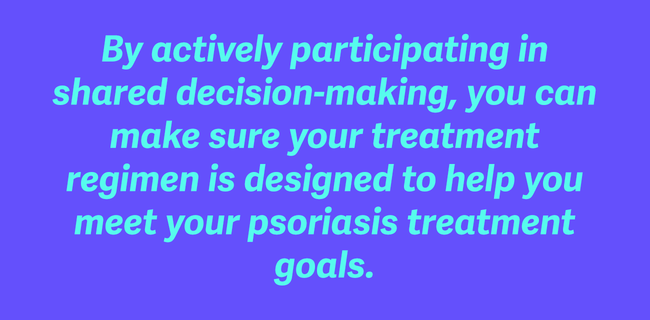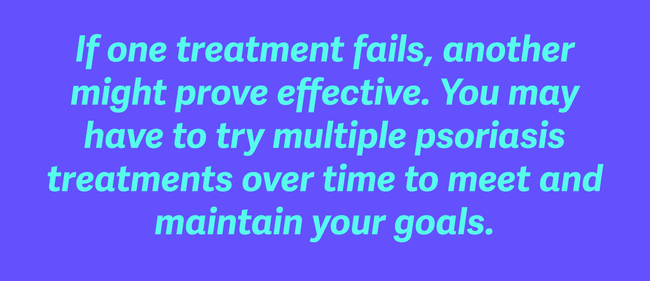
Powered By





For most people living with psoriasis, the ultimate goal of treatment is total skin clearance — the clearing of all evidence of psoriasis from the skin. Biologic medications have made total clearance an achievable goal for some, although 100 percent skin clearance is not always possible for everyone with psoriasis.
Some MyPsoriasisTeam members struggle to attain skin clearance. One wrote, “After 10 months, I’m starting to see some clearance — but not completely clear.” Even those who reach their treatment goals may have difficulty maintaining them. “I was completely clear a few months ago, but have now flared,” said another member. “So uncomfortable and embarrassing.”
Whether total skin clearance is possible for you or not, there are many factors to keep in mind when setting goals for psoriasis treatment.
Shared decision-making is an approach to setting goals and choosing treatments that involves cooperation between you and your dermatologist or any other health care provider who treats your psoriasis. In shared decision-making, you actively participate by discussing your priorities and preferences with your doctor. Make sure your doctor understands:
| You should know: how to get complete skin clearance in psoriasis |
Your doctor’s role is to educate you about available treatment options, the risks and benefits of each, and how each might help you reach your goals. Your doctor can help you set realistic expectations about:
Your doctor can also help you understand other ways psoriasis can impact your health. Treatment may lower your risk for developing psoriasis comorbidities and complications, such as psoriatic arthritis, cardiovascular disease, and inflammatory eye conditions.
By actively participating in shared decision-making, you can make sure your treatment regimen is designed to help you meet your psoriasis treatment goals.

For most people with psoriasis, treatment isn’t an “all or nothing” proposition. There are many factors to consider as you set psoriasis treatment goals.
In most clinical trials, the effectiveness of psoriasis treatments is measured using the psoriasis area and severity index (PASI), which rates skin improvement by percentage. While you may hope for total — 100 percent — skin clearance, consider how much clearance it would take to significantly improve your quality of life. In fact, the effectiveness goal set in many clinical trials for psoriasis treatments is 90 percent or even 75 percent skin clearance. Your doctor can help you set expectations for how much clearance you might see with a specific treatment.

Apart from the appearance of your skin, what other psoriasis symptoms affect your quality of life? Fatigue and itching are among the most common symptoms reported by MyPsoriasisTeam members. Many also describe trouble sleeping due to pain and itching from psoriasis. If a treatment may result in less itching, more energy, and better sleep, are these improvements worth factoring into your treatment goals?
Before you decide on your goals, consider how much you’re willing to commit to your treatment regimen. Even the most effective medication only works when you take it. If you are worried about missing doses or sticking to a schedule, make plans for how you’ll overcome those obstacles if they arise.
Your treatment goals may influence your treatment decisions, and vice versa. If you are unwilling to try certain types of therapies, you may need to modify your goals based on the effectiveness of the regimen you are comfortable choosing. Your doctor can help you weigh the risks and benefits, but it’s up to you to set your priorities.
Work with your doctor to evaluate the effectiveness of your treatment. Track your symptoms over time, and notice how they change with treatment. Your doctor will likely monitor signs of inflammation by ordering blood tests. Test results provide another way to evaluate whether your treatment is effectively controlling psoriatic disease.
Have your goals been reached? Did you experience improvement in ways other than the specific goals you set? Are you having trouble taking the medication as directed, without missing any doses? Keep the lines of communication with your doctor open as you continue to work toward meeting your goals for psoriasis treatment.
Keep in mind that there is no one psoriasis treatment that works for every person. Biologic therapies are often prescribed only after people have tried and failed on traditional disease-modifying antirheumatic drugs (DMARDs). And in some people for whom biologics are initially effective, the immune system eventually develops antidrug antibodies that can make the treatment less effective later on. In these cases, doctors may recommend switching to a biologic from another class of medications that work in a different way.
Wherever you are on your psoriasis treatment journey, remember that if one treatment fails to help you reach your goals, another might prove effective for you. You may have to try multiple psoriasis treatments over time to meet and maintain your goals.

If you want access to new treatments for psoriasis, ask your doctor whether participation in a clinical trial might be right for you. Some clinical studies offer the chance to receive investigative treatments that are not yet widely available.
Psoriasis can be challenging to treat. You may feel frustrated at times if your treatment goals are not being met. By joining MyPsoriasisTeam, the social network and online community for those living with psoriasis, you gain a support group of over 85,000 people who understand exactly how you feel.
What are your treatment goals for psoriasis? Do you partner with your doctor to work toward your goals? Share your thoughts in a comment below or post them on MyPsoriasisTeam.
Get updates directly to your inbox.



Become a member to get even more




This is a member-feature!
Sign up for free to view article comments.
A MyPsoriasisTeam Member
I have been using Soratinex for 15 months now and am clear.After 68 years , now 71, first time I have no psoriasis
Yes it is expensive, but really works.
We'd love to hear from you! Please share your name and email to post and read comments.
You'll also get the latest articles directly to your inbox.